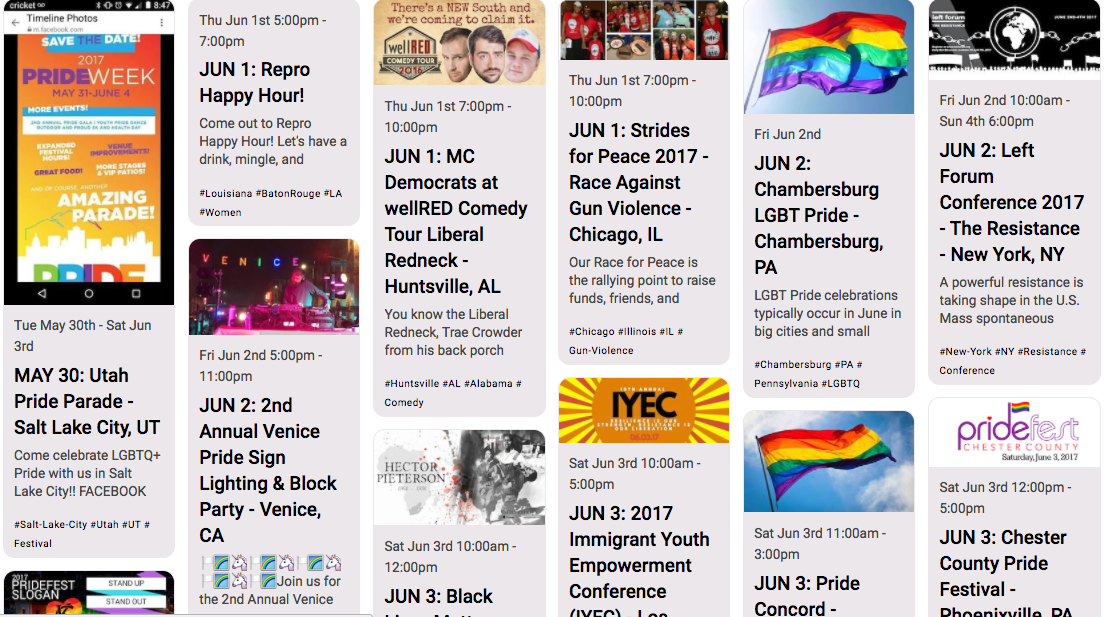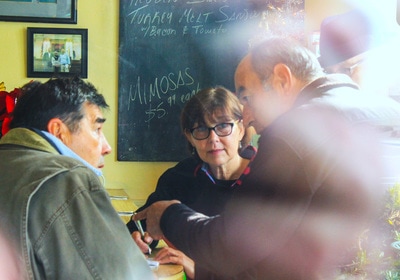|
These days it’s not uncommon to see cowboys, businessmen, and bikers bellying up to the bar in tutus. Yes, those frilly skirts ballerinas wear. And it’s all thanks to ultra-conservative Republican Senator Mike Enzi of Wyoming, who is still desperately trying to live down last month’s hideous homophobic gaffe and the maelstrom of protest that followed. It all started during a speech to students, when the Senator succumbed to an ill-advised impulse to elaborate on Wyoming’s “live and let live” mantra. “We always say in Wyoming you can be just about anything you want to be, as long as you don’t push it in somebody’s face. I know a guy who wears a tutu and goes to bars on Friday night and is always surprised that he gets in fights. Well, he kind of asks for it…” His audience, and the thousands to whom the remark was instantly tweeted, responded with outrage at the implication that it would be understandable — in fact, practically obligatory — for all real men to assault any guy wearing a tutu. The #LiveandLetTutu protest went viral, and soon men and women throughout the state were wearing tutus at work, church gatherings, and countless bars, many of which offered free or discounted drinks to anybody in a frilly skirt. Everyone had an uproarious time posting selfies on social media — except, of course, for Senator Enzi, who made furious and utterly futile attempts to explain away his remark. Reading his tweets about his “poor choice of words” you can almost hear the beads of sweat springing from his labored brow. If you missed out on #LiveandLetTutu, don’t worry, another act of collective defiance will be along any minute. Political protests are becoming a wildly popular pastime, especially in the United States. Michael Moore’s national Resistance Calendar shows 86 major protests planned for the month of June alone. Showing up for a march or wearing a rainbow tutu in a sports bar is great, but it's only the beginning. Being part of the Resistance involves a commitment to doing the hard work that real change requires. But if I’ve learned anything about motivation, it’s that we don’t do things because they’re easy, we do them because they matter. So what matters in the summer of 2017? How can you truly make a difference? 1. Champion voting. If 45% of eligible voters hadn’t stayed home on November 8, the world would be a different place today. Your next vote can help fix the mess we’re in. Online registration and absentee ballots make the process easy wherever you are. Learn about special elections, support progressive candidates and issues, speak out for electoral reform, and encourage friends to vote. 2. Commit to weekly action. Lots of groups offer weekly guidelines for meaningful activities; one of the best is the international Progressive Action, Global Exchange (PAGE). Last Monday's plan includes opposing environmental regulation rollabacks that would endanger the world’s chocolate supply. I think we can all agree that can’t be allowed to happen! 3. Pressure your legislators. The Indivisible Guide spells out simple, effective ways to do this, including attending town hall meetings and calling your reps. Politicians keep a close tally of opinions expressed by voters; make sure your voice is heard where it counts. 4. Join a Resistance group. Find listings of local groups on websites such as Indivisibles, PAGE, and Drinking Liberally, and look for city-based Resistance groups on Facebook. If you're overseas, contact Democrats Abroad and ask if there's a group in your area. 5. March. In the US, find protests via the Resistance Calendar or local news outlets. Living or traveling abroad? Check Americans Resisting Overseas or Google protests in the region. Taking to the streets is a great way to connect with individuals and groups passionate about issues you hold dear. Plus it’s good exercise! 6. Meet up with Resisters wherever you travel. Most groups have Facebook pages and list activities such as Madrid’s Hearing the Call or the Political Pub Quiz my group is holding in Seville on May 31. Connecting with fellow Resisters is a feel-good experience and a great way to exchange information and ideas.  One of Rich's happiest travel memories: discovering this giant bar of chocolate in Belgrade, Serbia. One of his greatest disappointments: realizing it was made of plastic. One of Rich's happiest travel memories: discovering this giant bar of chocolate in Belgrade, Serbia. One of his greatest disappointments: realizing it was made of plastic. 7. Recruit new Resisters over dinner. As we have found in Seville, a little spaghetti, a lot of wine, and a few heartfelt words about why the Resistance matters can transform potential members into active volunteers with a strong sense of mission. Every Resister has a deeply personal reason for joining the fight. For me, it was the slogan, “Make America great again,” a call to roll back the clock to an era — presumably somewhere around the 1950s — when rich white men ruled much of the earth. If you’ve ever wondered why there are so many gray-haired protesters, it’s because we remember what it was like back then: tough times for the 99%. Rich’s deepest concern is about the environment. He stands ready to do whatever it takes — yes, even wear a tutu in public, if necessary — to save the world’s chocolate supply. Do you have any Resistance activities planned this summer? I'd love to hear about them. YOU MIGHT ALSO ENJOY
13 Comments
Until now, my most terrifying flying experience was taking a small plane out of Palenque, Mexico to visit the Mayan ruins at Bonampak. The plane, and I use the term loosely, was more like a winged golf cart with six seats. As we strapped in, I learned the other two passengers were from Spain. There was no time for more; the pilot abruptly stepped on the gas and we bounced along the pitted runway heading toward some very solid-looking trees. As we picked up speed, I happened to glance over to my right, and there beside the runway lay another plane exactly like ours — crashed to smithereens. Before I could say, “Let me out here!” our plane leapt into the air clearing the trees by inches. Behind me, the Spaniard shouted “Olé.” Not to keep you in suspense, we did survive the flight. But it gave me a benchmark for aviational terror that has stood for many years. However, the recent announcement that officials were likely to extend the ban on laptops and Kindles in the passenger cabin of all Europe-USA flights had me seriously rattled. For a start, the reasons cited for the ban were beautifully worded to sound exactly like what they would tell you if they wanted to cover up the real reason. They contained phrases like “ISIS threat” and “national security” and “if I told you more I’d have to kill you.” Well, OK, maybe not that last, but they were remarkably vague yet menacing. I was forcibly reminded of those government’s warnings about an “anthrax scare” designed to keep us all away from the alien landing site in Close Encounters of the Third Kind. I’m not saying the current administration is actually covering up an alien invasion — although at this point, nothing would surprise me. As of yesterday, all I really knew was that next month, when heading back to the USA from Spain, I'd likely be prohibited from taking any electronics larger than my smartphone in my carry-on luggage. “How am I supposed to spend all those hours on a plane without a Kindle?” I moaned to some fellow expats. “And do I check my laptop, and risk it being damaged or stolen? Or leave it behind and buy another when I get to the USA for the summer? This is insane!” “Those are the least of your worries,” a friend said. “Think about all those lithium batteries being packed in the cargo hold. You know they’ve caused explosions and crashed planes. It’s scary enough to think there might be one or two down there. You have seventy of them? Down below where nobody will notice right away if they do burst into flames? That’s insane. My husband and I decided this morning if the ban happens, we won’t be flying.” Yikes! That kind of put my worry about running out of reading material into perspective. As if all that wasn’t enough to provoke nightmares, articles began appearing describing the kind of chaos the ban would create at airports, sparking endless delays, missed flights, lost luggage, and thousands of seriously grumpy passengers. So you can imagine how thrilled I was to wake up this morning and read this headline: Later articles, including a revised version of the one shown above, aren't quite so definite. "Laptop ban may not be extended to Europe," the Guardian headline now reads. Others say the ban is "off the table," at least for the time being. “Apparently the aliens decided not to visit Earth this week,” I said to Rich. “And who could blame them?” But just to make sure we don’t get too comfortable, officials announced they are considering other security measures. “Nude flying,” Rich said. “It’s the next logical step.” If that happens, my friends, I am definitely staying home. YOU MIGHT ALSO ENJOY Every spring, Seville stages a week-long fiesta that includes, among its many outlandish traditions, the wearing of skin-tight polka dot gowns with enormous ruffled flounces. Afterwards, there is endless talk about how gorgeous we all looked, and everyone pulls out phones to compare photos. When I showed this one to a group of women in my yoga class, they fell silent. Finally one woman said, “Karen, I love the dresses but what have you two got on your heads?” “Pussyhats,” I said. We stared at each other in mutual incomprehension. I was astonished they didn’t know what I was talking about. Because even if they had somehow missed the massive news coverage of the Women’s March in Washington on January 21, since then European fashion designers have gone wild over the protest hats, most commonly produced in a bold shade known as “shocking pink.” You can’t spend five minutes in the waiting room of a hairdresser or dentist without opening a magazine proclaiming that power pink is the new black. Even Barbie has abandoned her sugary pastels in favor of revolutionary rose. The Pussyhat Project was the brainchild of Krista Suh and Jayna Zweiman, who met in a Los Angeles knitting class. “When the news of the Women’s March came up, I knew immediately I would go, but I wanted to do something more that could help the movement,” recalls Krista. “And I couldn’t really think of anything until I realized, as an LA girl, that flying to [Washington] DC I would be really cold. I figured if I, as a beginning knitter, could knit a hat, anyone could. And that’s when it really clicked. If we released the pattern, women everywhere could knit these hats, and it would create, like, this beautiful sea of pink at the march.” Krista, Jayna, and their teacher, Kat Coyle, developed a simple rectangular pattern that could be folded and stitched together. When you put one on, the center rounds over your head, leaving the corners poking up and looking a bit like cat ears. That's one of the inspirations for the name. The other, of course, is taken from some less-than-edifying remarks by the man who would become our 45th president. “You know, I’m automatically attracted to beautiful — I just start kissing them. It’s like a magnet. Just kiss. I don’t even wait. And when you’re a star, they let you do it. You can do anything,” he said, apparently unaware his microphone was on. “Grab ’em by the pussy. You can do anything.” These remarks were offensive on so many levels, including the term “pussy,” which — as I explained to my European yoga mates that day — is a vulgar slang term for vagina. The term "Pussyhat" is a deliberate step towards reclaiming and reframing the word in a feminist context. As news of the Pussyhat Project spread, women around the globe began knitting hats and sending them to Krista. I’m not sure even she knows how many thousands of them her team distributed to the 500,000 protesters in Washington on that freezing January day. I’ll always regret having missed out on the Women’s March, being en route from the USA back to Spain at the time. In February, when American Resistence Sevilla began planning a march for International Women’s Day, I recalled that Sine, one of my readers, had said in a comment on my blog, “The only thing keeping me sane is knitting pink Pussyhats with my daughters.” When I wrote to her, Sine jumped at the chance to knit hats for Seville Resisters in exchange for donations to Planned Parenthood. Today, hand-knitted pink protest hats are popping up in surprising places. During Fashion Week in Milan, held just prior to International Women’s Day, Italian designer Angela Missoni, her family, and her models appeared on the runway in Pussyhats. A photo of that moment is featured in a call-to-arms piece entitled “El despertar de la fuerza” (The force awakens, from the title of Star Wars VII) in the Spanish edition of Vogue magazine. Being part of that awakened force myself, I know our task is daunting. “Violence against women is a world pandemic,” proclaims the most recent UN report on women and gender equality. “Between 45 and 55% of women in the European Union have suffered a sexual assault during the last 15 years.” In 2016, the World Economic Forum predicted the gender gap won't close until 2186. Even 169 years may be overly optimistic now; America's new “white, male, chauvinistic administration is setting equality back decades — and making the world a more dangerous place,” according to Foreign Policy magazine. I didn’t get into quite this much detail with my friends from yoga, of course, but they seemed fascinated by the story and my photo. “Did you wear those hats to the Feria?” someone asked. “Oh, hell no,” I said. There is a time to protest, and a time to put flowers in your hair and go enjoy the party. But my stack of Pussyhats is sitting beside me as I write this, just waiting for the next opportunity to let the world know that we are awake and ready to rumble. Do you have a photo of yourself wearing a pink Pussyhat? Send it to me at [email protected] and I'll add it to this post. Jeanne, 82, in her Pussyhat. "This is crazy," she says of the current political situation in the USA. "We have to do something about it!" Amen to that, Jeanne! YOU MIGHT ALSO ENJOY When we’re abroad, Rich and I strive to adapt gracefully to whatever bizarre stuff the world throws at us. One of my most cherished photos shows him in India, squatting in front of cobras, madly playing a grimy flute. The snake charmer, evidently feeling the scene requires more drama, is draping a large yellow serpent around Rich’s shoulders. “What yellow serpent?” Rich said afterwards. “I never even saw it. Believe me, when you’re staring into the eyes of a cobra, all you can think of is — play.” “You were probably in more danger from the germs on that guy's flute. How could you put that thing in your mouth?" “What was I supposed to do? He motioned me over and shoved the flute into my hands. I didn’t want to offend him. Or the cobras.” As travelers and expats, Rich and I have spent an extraordinary amount of time trying (with varying degrees of success) not to offend local sensibilities. This summer we’ll be putting our fitting-in and going-along skills to the test as we return to a changed America. Like hundreds of thousands of other expats making annual summer pilgrimages to the homeland, we’re a bit worried we’ll find a country we hardly recognize. The headlines are frankly terrifying. The president’s “supporters call for ‘liberal genocide and deportation of Jews’ at Arizona rally.” “Historian Timothy Snyder: ‘It’s pretty much inevitable’ that [the president] will try to stage a coup and overthrow democracy.” “Anti-Muslim Hate Crimes Are Spiking in the U.S.” “Prospects for black America about to get worse.” “Latino immigrants living in fear, preparing for deportation.” “Cheeky Protesters Moon [the president’s tower in] Chicago To Ass-ert Their Outrage.” OK, that last one isn’t so scary, but still, conditions do seem worryingly volatile. Absorbing these stories from afar is like watching a dystopian, near-future disaster movie. Clearly civilization as we know it is doomed. Yet emails from family and friends sound surprisingly normal, chatting about kids’ soccer scores and home repairs. Occasionally they’ll throw in a casual reference to living in Mordor, the region occupied by the forces of evil in Lord of the Rings, or call the president “the Dark Lord,” a euphemism for Harry Potter’s archenemy, the villain-who-shall-not-be-named. In fact, many Americans deliberately avoid using the president’s name, like actors who won’t say the title of Shakespeare’s “Scottish Play” because of all the bad karma associated with it. America2.0 is clearly going to be a challenge for all expats, and I’ve come up with a few strategies that may help. 1. Wait and see what’s going on. Before pre-ordering body armor or a backyard bunker kit, let’s find out whether the “armed camps” mentioned in the media are metaphorical or real. This will depend, of course, on the neighborhoods we’re frequenting and whether events take a nasty turn during our stay. 2. Show empathy and respect; above all, listen. “Political animosities have reached a really dangerous level,” says Stanford sociology professor Robb Willer. In his TEDD Talk, “How to have better political conversations,” he suggests reframing our rhetoric so we can begin finding common ground. Shortly after the election, Rich and I drove through a conservative agricultural area and found our fellow Americans were delighted to share their stories over bottomless cups of coffee in roadside diners; we learned a lot and began to feel the divide wasn’t entirely unbridgeable. 3. Find fellow Resisters in the USA. Learn what’s been happening and exchange ideas, resources, and mutual support. Reach out to a local Indivisible group, partners of the Women’s March on Washington, or such organizations as the grassroots #KnockEveryDoor, Run for Something, which recruits and supports progressive young candidates, or the PussyHat Project for knitters with attitude. 4. Connect with Resisters in other countries you’re visiting. While planning our recent trip to France, I wrote to a friend at Democrats Abroad who put me in touch with Resisters in French cities; you can also find groups through Facebook. Meeting Resisters in congenial cafés to discuss the fate of the world over a glass of vin was inspiring and tremendous fun. 5. Get ready to vote. I’m astonished how many of my expat friends didn't register to vote in the last election. Reasons included “Does it really matter?” and “Too much hassle.” I think events have proved elections do matter. And registration is easy online. You can register and request an absentee ballot via Vote from Abroad or download a form directly from your state’s website. Some states let you complete the whole process online; others require you to mail in the form. Find out if your state has a special election coming up. And while you’re at it, remind friends that if they want to complain about the government (and who doesn’t?) voting speaks louder than words. Visiting the Divided States of America seems a bit daunting to me, but Rich is maintaining his usual insouciance. “Hey, I’ve stared down a rampant cobra,” he says. “You think I’m scared of politicians?” I guess we’ll find out this summer. YOU MIGHT ALSO ENJOY |
This blog is a promotion-free zone.
As my regular readers know, I never get free or discounted goods or services for mentioning anything on this blog (or anywhere else). I only write about things I find interesting and/or useful. I'm an American travel writer living in California and Seville, Spain. I travel the world seeking eccentric people, quirky places, and outrageously delicious food so I can have the fun of writing about them here.
My current project is OUT TO LUNCH IN SAN FRANCISCO. Don't miss out! SIGN UP HERE to be notified when I publish new posts. Planning a trip?
Use the search box below to find out about other places I've written about. Winner of the 2023 Firebird Book Award for Travel
#1 Amazon Bestseller in Tourist Destinations, Travel Tips, Gastronomy Essays, and Senior Travel
BLOG ARCHIVES
July 2024
CATEGORIES
All
|









































